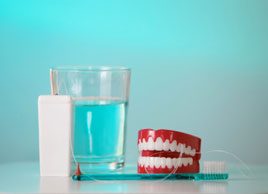7 rules for denture care
Keep smiling with our simple tips for keeping your hard-working dentures in good shape

Source: Web exclusive, May 2011
If some or all of your permanent teeth have fallen out or been removed, you may be using dentures: complete dentures if you’re missing all of your natural teeth (which is the case for one in 15 Canadian adults under 80) or partial dentures if you’re missing just one tooth or a few teeth. Both types need special care. Here are seven golden rules for looking after your dentures.
1. Give them a break.
Take your dentures out before going to bed. "The mouth tissues can recover from wearing them during the day," says Dr. Lewis West, a Toronto dentist. If taking your dentures out at night is not an option for you, then be sure to remove them for six to eight hours at another time of day. Soak your dentures in warm water if they have metal clasps. If they don’t, you can use either a half-vinegar, half-water solution or a special denture cleanser. Soaking will help to remove stains, plaque, tartar and bacteria.
2. Handle them with care.
Chances are, your dentures didn’t come cheap. And since they can break easily, you’ll want to be careful with them. Clean them over a folded towel or bowl of water in case they drop. Don’t use toothpicks when you’re wearing them, and don’t use strong cleaners or hard brushes to clean them. All of these can cause damage to your dentures. And never leave them where young children or pets can reach them.
3. Clean them daily.
Just because these aren’t your real teeth, that doesn’t mean they don’t need regular cleaning. "They can still build up stains and tartar on them, and bacteria," says Dr. West. If your dentures are plagued with plaque, it can lead to problems in the tissues underneath, such as infection and irritation. Brush your dentures with a regular soft-bristled brush’not the same one you use for your real teeth. You can also use a special denture cleaning brush. Regular hand soap, mild dishwashing detergent, mildly abrasive toothpaste and dental paste are all good choices for cleaning dentures. "There are many products available now at the drugstore to help in the cleaning," Dr. West says.
4. Look after your whole mouth.
Even if you have complete dentures, you still need to care for your gums. Whenever you take out your dentures, give your mouth a good rinse and then massage your gums with a washcloth or a soft toothbrush. If you have partial dentures, you still need to properly brush and floss your regular teeth every day.
5. See your dentist.
Whether you have partial or complete dentures, you still need to see your dentist at least once a year. "The dentist will examine your oral tissues for changes and for sores that might become cancerous," says Dr. Euan Swan, manager of dental programs at the Canadian Dental Association in Ottawa. "The dentist will also provide advice as to oral hygiene and denture care."
6. Watch for changes in fit.
If your dentures aren’t fitting properly or don’t feel right, that’s another reason to check in with your dentist. The gums and bones in our mouths change over time, which can lead to an improper denture fit. Poorly fitting dentures can cause problems like sores, pain and burning. They can even cause abdominal gas from swallowing air. Your dentist can adjust your dentures. Dentures that don’t fit can also be a sign of periodontal disease, so it’s important to get checked.
7. Nourish the rest of your body.
Since dentures may make it difficult or even painful to bite and chew fresh fruits and vegetables, there’s a risk you’re missing out on essential nutrients. Make sure you’re eating a well-balanced diet by following Canada’s Food Guide. Research suggests that proper nutrition slows the progress of gum disease, so a healthier diet could even mean a healthier mouth.
Don’t miss out! Sign up for our free weekly newsletters and get nutritious recipes, healthy weight-loss tips, easy ways to stay in shape and all the health news you need, delivered straight to your inbox.




